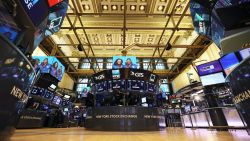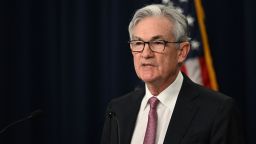Hindsight is 20:20, even for the Federal Reserve.
The US central bank is in the midst of a “whatever it takes” moment when it comes to inflation, but if Fed officials had known how high inflation would rise, they would have changed their course on policy earlier, Fed Chairman Jerome Powell said Tuesday.
“In hindsight, it would have been better to raise rates earlier,” Powell said in an interview at the Wall Street Journal’s Future of Everything event.
The central bank raised its benchmark interest rate by a half-percentage point earlier this month, following a smaller rate hike in March, in order to get a handle on the highest inflation in 40 years. It also announced the unwinding of its massive balance sheet.
“We know that this is a time for us to be tightly focused on the time ahead and getting inflation back down to 2%,” Powell said. “No one should doubt our resolve in doing that… What we need to see is inflation coming down in a clear and convincing way.”
And to get there, interest rates will have to rise further, even if that means going beyond the level that is understood as “neutral,” commonly thought to be around 2.5%.
Former Fed Chair Ben Bernanke on Monday criticized Powell’s Fed for acting too slowly.
“Why did they delay their response? I think in retrospect, yes, it was a mistake,” he said during an interview with CNBC.
Powell pushed back against that sentiment on Tuesday, saying that the bank is moving rather quickly compared with previous decades. He also reiterated that more half-percentage point increases were on the table for this year’s policy meetings.
Last summer, when Powell categorized rising inflation as “transitory” and mostly related to the pandemic, economic data looked very different, he said.
“The data changed pretty thoroughly in October, and we responded to that,” Powell added. “I don’t know that financial conditions tightened more quickly than this in a very long time.”
But “quickly” means something else in the world of monetary policy: A central bank’s tools are blunt, and actions take time to take effect. “Monetary policy works through expectations,” Powell said. “It’s been good to see financial markets reacting.”
Powell and his colleagues are attempting a soft landing – bringing inflation down and normalizing policy without hampering economic growth too much.
“Sometimes the landing is just perfect, and sometimes it’s just a little bumpy,” he said. But this time “there could be some pain involved.”
America’s job market, for example, is still very strong but could face some wobbles if the Fed doesn’t stick the landing.
On the whole, however, the US economy, its labor market and growth expectations are strong, Powell added. That said, he acknowledged that the war in Ukraine and pandemic shutdowns in China are affecting domestic growth, and the Fed needs to remain watchful.
–CNN Business’ Nicole Goodkind contributed to this report

























